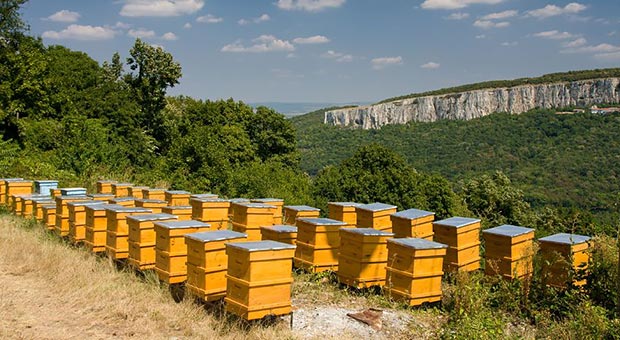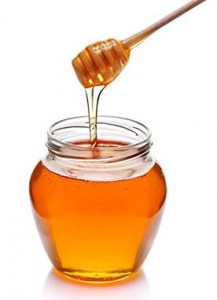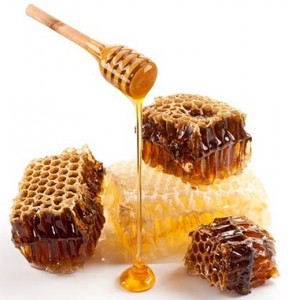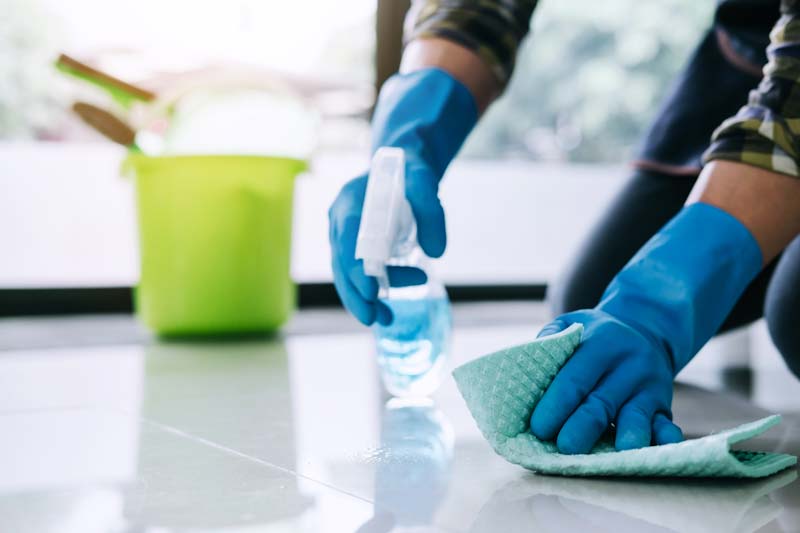Of course you should! Raising bees for survival has many benefits and the process itself, though time consuming, isn’t particularly difficult. For many, the cost of starting a hive is prohibitive, because beekeeping equipment can be pricey. However, if you build it yourself, it can be fairly affordable.
Today we’re going to discuss the merits of raising bees for survival and talk a bit about how to get started.
Nutrition, Health and Medicinal Purposes
The first benefit of raising bees is, of course, for the honey that they produce. It’s delicious and now studies have proven that it’s also good for you!
Honey is the only 100% natural sweetener that has been studied and proven to have both health benefits and no negative physical side effects (other than making you pudgy if you eat too much!).
In addition to making your tea delicious, the health benefits of honey are well documented. They include:
- Honey is a natural antibacterial shown to hamper the growth of such bad bugs as E-Coli, Staphylococcus aureus, salmonella and even the bacteria that causes acne. It also protects cuts, burns and other wounds and helps with the healing process.
- Honey is packed with flavonoids – antioxidants that help reduce the risk of cancer, cardiovascular disease, and even aging.
- Honey is an anti-fungal and anti-inflammatory.
- Honey relieves coughs and sore throats.
- Honey helps relieve allergies
- Equal parts of water, vinegar and honey work as an effective natural anti-parasitic.
In addition to honey, bees also produce propolis, a glue-like substance that they use to seal their hives and keep them sanitary. Propolis has antibacterial, anti-microbial and anti-fungal properties that are at least as strong as the ones found in honey. As a matter of fact, if an intruding bee dies in the hive, it’s mummified in propolis in order to preserve the cleanliness of the hive.
Propolis also:
- Helps relieve pain in cancer patients
- Helps lower cholesterol
- Helps treat endometriosis
- Acts as a powerful antioxidant
- Relieves joint pain
The health and nutritional benefits of honey are only the first reason to raise bees for survival but they’re not the only ones. Let’s move on!
Honeycombs Have Many Uses
Before the bees can make honey, they have to build a comb to put it in. The honeycomb is made up of hundreds of identical 6-sided cells lined with a wax that bees secrete from their glands. There are many common uses of honeycombs that would be beneficial in a survival situation, including:
- As a luxury edible. Cut a chunk of the comb off and eat it – it’s crunchy, honey-coated deliciousness!
- Candles. Beeswax candles burn longer and cleaner than paraffin candles and it’s relatively simple to render into wax.
- Honeycombs are what you make beeswax from, as we just revealed. Beeswax is a wonderful ingredient to use when making lotions, lip balms and other moisturizers.
- Weatherproofing – beeswax will be a valuable tool when you need to waterproof something. Just rub it into the leather, thread, wood, or other porous material and voila! It’s waterproof, softened, and even preserved!
- Thinned beeswax and mineral spirits make an excellent polish for bullets, gun metal and stocks.
- Beeswax-soaked paper makes an excellent fire starter.
As with all things survival related, honeycomb and beeswax can be used in a multitude of ways limited only by your creativity!
Barter
In a survival situation, honey, propolis, honeycombs, beeswax and candles are going to be luxury items in great demand. You’ll be able to ask a good price for them in trade for something else that you may need. It’s likely that in a post-SHTF situation, barter systems are going to about the only way to get necessities and niceties. It’ll be good to have something self-replenishing to trade.
Crop Pollination
Bees draw pollen from flowers in order to eat and to make honey. During this process, transfer of pollen from one plant to another takes place so your crops are going to be well-pollinated. This keeps them healthy and flourishing.
This is Great, But How Do I Get Started Raising Bees for Survival?
Starting a hive is surprisingly easy, though we wouldn’t recommend doing it before you research it heavily. For the purpose of this article, we just wanted to present you with valid reasons WHY you should raise bees for survival.
For now, though, we would like to say that, even if you live in an urban area, it’s possible to raise a small hive and you can get started for $300-$500 dollars. If you build your own hives or skeps (portable, dome-shaped hives), starting your colony will cost little to nothing. Most experienced beekeepers prefer hives with suspended, movable frames (aka Langstroth frames) so that it’s easy to remove the honey combs. They’re pretty easy to build.
You’ll also need to research which bees are best to raise for survival. African Honeybees were developed by scientists and have made their way to the US. They are so aggressive that they will literally kill you if you don’t kill them first, so you may want to avoid them, since the subject here is survival! Carniolan, Russian and Italian honeybees are some of the most docile bees.
Finally, if you’re going to raise bees for survival, you’ll want to invest in the proper beekeeping clothing and tools. There aren’t many things that you need but a good smoker and a sealed uniform are among them.
After you establish your hive, there’s very little maintenance involved as long as your bees stay healthy. Raising bees for survival is a good idea on a number of levels, so we suggest that you seriously consider it. Of course, if you have allergies, be sure to take precautions in order to protect yourself!
We’d love to hear what your thoughts are on this topic. Have you raised bees? Are there other bee-related topics that you’d like to read about? Let us know in the comments section below!
This article has been written by Theresa Crouse for Survivopedia.
Photo sources: 123RF.com.












Tim Watson | March 3, 2014
|
I have been thinking about this for a long time. I have even taken some bee classes. Unfortunately, I live in an HOA right now that doesn’t allow that kind of thing. I will post this article on my Facebook page and see who is interested. Thank you for this article.
Toby | March 4, 2014
|
The bee strain you need to recommend are Buckfast bees. They are resistant to both kinds of mites, and are good producers. They are also docile, considering you are periodiaclly ripping the roof off their house, and stealing food from their pantry.
Those considering bee keeping should find a local club to answer their questions and give locally filtered directions. When I started, the local club gave me some equipment to help me start. It is a great hobby, and can be a money maker.
It is complex enough that you do not want to wait to try it “after’ things break down. I could build up hives, without outside support, but I have been doing this for a long while. Buy the first hive, but build the second, for the hands on training each experience provides. Make sure they have plenty of room, or they will swarm, and you are then left with a weaker hive. Placing smaller hive sections called “Supers” with a queen excluder between the hive base and the supers (to keep her from laying eggs in the honey storage area) is the most common layout.
Stings. Stings happen, if you bee keep. They are minor, and the bee can only sting once. As a side note, deliberate stings are used as medicine to treat arthritis, Parkinson’s, and MS that I know of, and maybe more.
If things shell out, sweet will be sought after, and Honey is SWEET, LOL! It is the basis for Mead, and distills well for stronger. Honey is very easy to store, and lasts for years without special treatment.
There is one error in your article. African honey bees are not as bad as people believe. They cannot survive north of the frost line like European variants can. They are more aggressive, but make more honey, and their stings are less powerful than even a normal honeybee. With a bee suit, you are perfectly safe. From what I have read, the bee keepers in Brazil prefer them, because people leave the hives alone, and they get more honey per hive. That said, unless you are south of the freeze line, you will not have to deal with them.
Stan | March 4, 2014
|
About the Africanized bees. My line of work is pest control and I frequently deal with bees. I would not advise anyone to try and raise Africanized honey bees for honey production if they have access to any of the variants of European honey bees. AHBs have smaller hives and a higher percentage of guard bees so there is a lower, not higher amount of honey production. The fact that they are so easily pissed off means you have a harder time dealing with them and the stress of a bee keeper busting into their hive can cause the entire hive to abandon your apiary if they are unsuccessful in killing you first. You also might have to worry about neighbors up to a quarter of a mile away since the sound of a lawnmower or weedeater can send them out by the thousands to attack. Can you imagine the lawsuit if they are stung by your “Killer Bees”? And since AHBs have genetically dominant DNA, any docile EHBs they mate with will be infected and eventually turned into agressive AHBs.
Toby | March 4, 2014
|
I totally agree they are aggressive! The smaller hives doesn’t mesh with what I have read, because their attack is only dangerous to a large animal, if their numbers are great. They say that 30,000 can attack together, that is a respectable hive! Wild hives have a harder time building numbers, so that may effect the local bees where you are. How far south are you? What is your hive mix percentages, European to African? Do you kill them with detergent water, or commercial poison? I find charcoal starter to be very effective too.
The original experiment on the African bees off the coast of Brazil (that went wrong when they escaped the “Safe” Island and made it to the mainland) was to attempt to cross breed them with the European strains. This was supposed to make them more docile, and less temperature sensitive, while keeping the production rates. If you are getting poor production, it is usually a smaller, or sick hive. African bees kill the existing queen and drones, and take over the hive. The justification for the initial experiment was their higher honey production, without it, there would be no reason to begin that fateful experiment (and we all would be better off). Fortunately, the were unable to produce their “hybrid” or we would not be protected by the freeze line. Since they can not move above this freeze line, I have had no direct contact with them, and never will. South of that line, bee keepers do have to work with them as a necessary evil.
It is also interesting to note that in Africa, they are being wiped out by a bee that pretends to be a queen by giving off the right smell (smells like lemon Pledge), but lays no eggs.
You can get a similar effect to their aggressiveness with European bees, if you open several hives together, after a move. I found this out the hard way, fortunately fully suited. The more experienced bee keepers already knew this, but I hadn’t asked. One more reason to get into a good bee keeping club! Another advantage to a club, is that members get calls to remove swarms, which is a great source of bees. Try to keep a hive body empty in case you get that call, or your own hive decides to swarm. they usually assembly locally, and can be hived if you are ready.
Pingback:Raising Bees for Survival: Should You Do It? | TheSurvivalPlaceBlog | March 4, 2014
|
M Tungren | March 4, 2014
|
hOW DO YOU PROTECT HIVES FROM BEARS?
Toby | May 26, 2015
|
Never had trouble with bears, but if I did, I guess I would fence them off from danger. Since I am in Suburbia, I would also be inclined o shoot any local bear to protect the local kids.
Pingback:Julie's Weekly Roundup 3.8.14 - Home Ready Home | March 8, 2014
|
Pingback:Survival Honey Bees: Which One Is Right for Your Area? | May 4, 2014
|
Toby | May 26, 2015
|
I prefer Italian bees. They work hard, and are very easy to deal with because the3y are calm most of the time. I fed for hives to day in sandals and a t shirt and they ignored me.
Pingback:The Survival Hive: Which Bee Is Right for You? | TheSurvivalPlaceBlog | May 6, 2014
|
Pingback:Multipurpose Items To Survive Crisis On A Budget | Survival skills, survival guns, survival guide | September 10, 2014
|
Paul | May 23, 2015
|
Anyone considering keeping bees might want to look into this fascinating bit of equipment:
http://www.honeyflow.com/
Toby | May 26, 2015
|
Bees are one survival skill that leaves you with something valuable (the bees) that thieves will leave alone, even if they steal other stuff. The resulting honey will give you barter to restock with. There are a lot of ways a bee keeper can be self sustainable, given time to build up and practice ahead of time. On youtube look at “the fat bee man” and “Little creek bee ranch” for helpful info. Find a local bee club for focussed help. Other sources are :H&R Apiaris for bees, Walter Kelly for hives and foundation; Dadant for suits and gear, and Atwwods for assembled hives. I have no affiliations with any of these, but I do buy from them myself.
Pingback:Did Chemtrails Murder Prince And Merle? | Prepper's Survival Homestead | April 26, 2016
|
Pingback:Did Chemtrails Murder Prince And Merle? | Survivopedia | April 26, 2016
|
Pingback:How The World Would Change Without Fuels? | | disasterdefense.us | May 25, 2016
|
jason smith | November 20, 2017
|
When processing honey from a beehive, a good rule of thumb is for every 60 pounds of honey produced one (1) pound of beeswax will be made (1 to 60 ratio).
http://knifearmory.ecrater.com/
Pingback:How The World Would Change Without Fuels? | Survivopedia | June 22, 2018
|
Pingback:7 Tips On Getting Your Honeybees Ready For Winter | Survivopedia | September 26, 2018
|
Beekeeping | November 25, 2020
|
This was great information that you have presented through this article. Thank you for sharing this wonderful article.